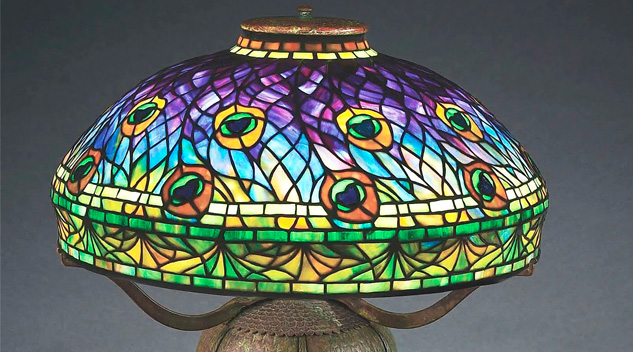#Tiffany #Lamps #Amphora #Pottery #Light #Morphy #Bidders #Antiques #Arts #Weekly
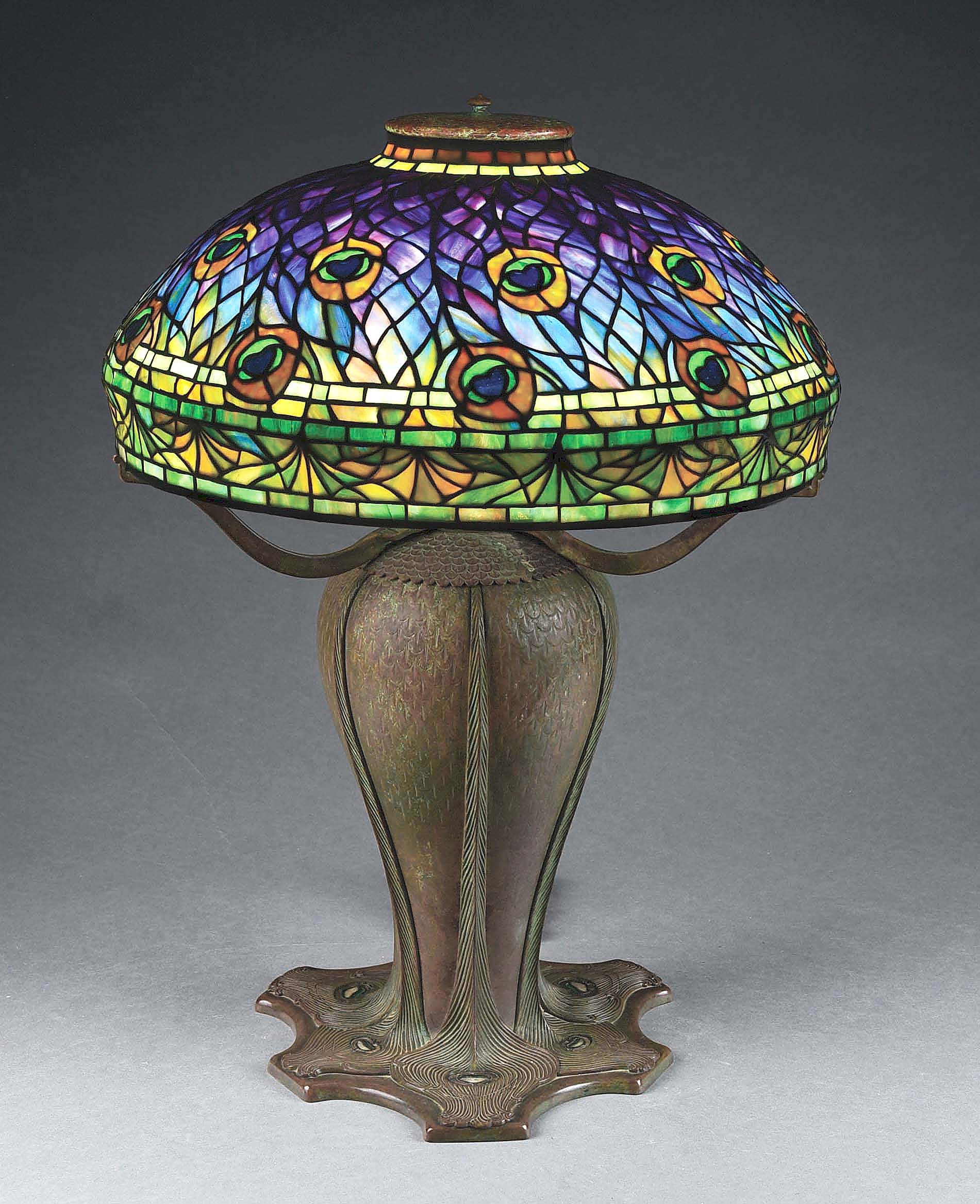
The top lot of the sale was this Tiffany Studios Peacock table lamp with a four-socket bronze Peacock base, measuring 21¾ inches tall and 18 inches in diameter. It achieved $307,500 ($200/300,000).
Review by Carly Timpson; Photos Courtesy Morphy Auctions
DENVER, PENN. — Morphy Auctions conducted an auction of Fine & Decorative Arts on December 18-19. With 1,216 lots offered, the sale realized more than $1,980,000.
Of the nearly 100 art glass lamps offered in the sale, a number from Tiffany Studios stood out. In fact, the top four lots were all Tiffany table lamps. The sale’s leading lot was a Peacock lamp with Peacock base. The leaded glass shade is designed to resemble the vibrant feathers of a peacock. The colored glass is arranged in a gradient with deep amethyst at the top and emerald green around the shade’s apron. The flamboyant shade sits atop a rare matching Peacock base. The four-socket bronze base is decorated with a scale or feather pattern and six elongated peacock feathers extending downward to form the foot of the base. At the foot, each feather has a distinctive eye with inset Favrile mosaic glass. This iconic Tiffany lamp achieved $307,500.
Finishing right behind was a Nasturtium table lamp, one of Tiffany’s most intricate and complex glass designs. Composed of streamer, confetti, ripple and drapery glass, the Nasturtium shade depicts the plant’s lily pad-shaped leaves and trailing flowers in shades of orange and yellow. Sitting on a three-socket library base with an authentic Tiffany heat cap, the lamp sold for $110,700. Also on a bronze three-socket library base — this one with an onion bulb pattern — was a Daffodil shade. The yellow flowers and green leaves stand out against a light blue background. Likely originally made with gold doré, the surface has faded to a brown patina with some gold still visible on the inside of the shade. The Daffodil lamp earned $73,800.
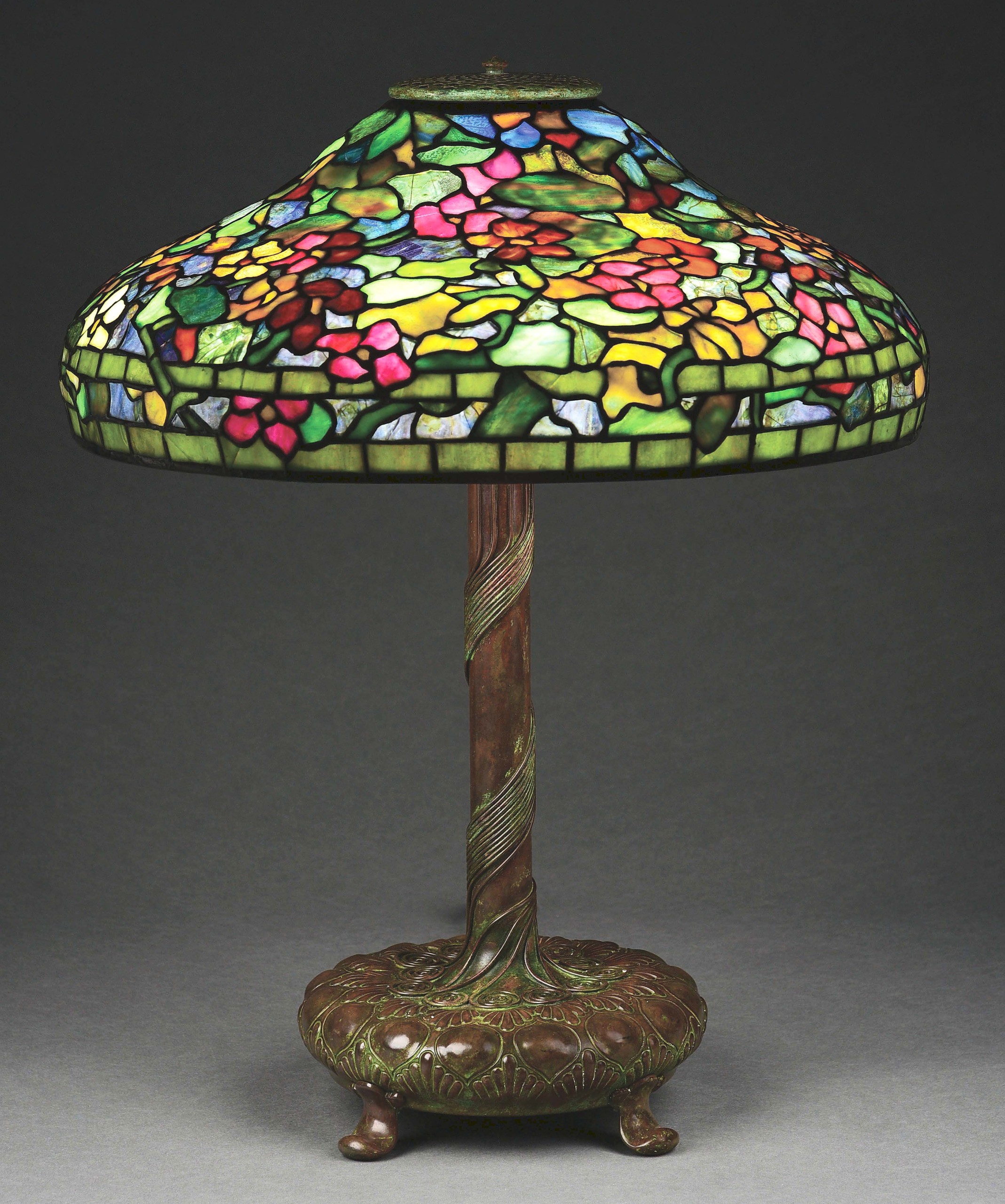
Tiffany Studios leaded glass Nasturtium table lamp with bronze onion bulb library base, 23 by 18 inches, earned $110,700 ($100/150,000).
Rounding out the top four lots was a Wisteria lamp from the collection of Tiffany expert and author, Dr Egon Neustadt, which sold for $46,080. This lamp is said to be one of the finest examples of its kind, with complex glass wisteria blossoms in rich blues, descending to purple at the bottom. The confetti and streamer glass Wisteria shade rests on a four-socket bronze tree-form base. Also from Neustadt’s collection was a floor lamp with a Water Lily orb shade. The leaded glass orb may be a high-quality reproduction and not an authentic Tiffany shade, but the 60-inch braided base with clawfoot pedestal and a winged griffin riser is signed “Tiffany Studios New York.” Despite its possible inauthenticity, the floor lamp earned $23,370. Finishing at the same price of $23,370 was another Tiffany table lamp. This one, a primarily green shade with a yellow lemon leaf band, is on a bronze Mock Turtle base with three sockets.
While not Tiffany, an extremely rare and intricately painted example of a Handel lamp was also of interest to bidders. The reverse-painted woodland scene riverbed table lamp, signed “Handel 5673” and on a three-socket base with a decorated platform, sold for $28,160. Both the shade and base were authentic Handel, but the finial was a replacement.
Bidders also took a liking to Amphora pottery. One particularly rare piece, a circa 1902 secessionist carved vase with a sculpted yellow crocodile applied to the base, earned $31,980. The underside of this blue-green iridized vase had Amphora oval, Crown, Austrian oval and Imperial Amphora markings. An image of the vase is featured in Byron Vreeland’s 2011 book, Monsters and Maidens: Collector’s Edition. Also featured in Vreeland’s book is an example of the circa 1900 high-fired porcelain “Nymph of the Forest” figural sculpture, which sold for $12,300. The 17¾-inch-tall blue and gold figure had markings from both RSTK and Amphora. Another circa 1900 piece, a rare earthenware sculpted starfish vase achieved $17,220. The 8-inch-tall vase had a raised wavy body to represent the sea and two red-glazed starfish applied to the sides.
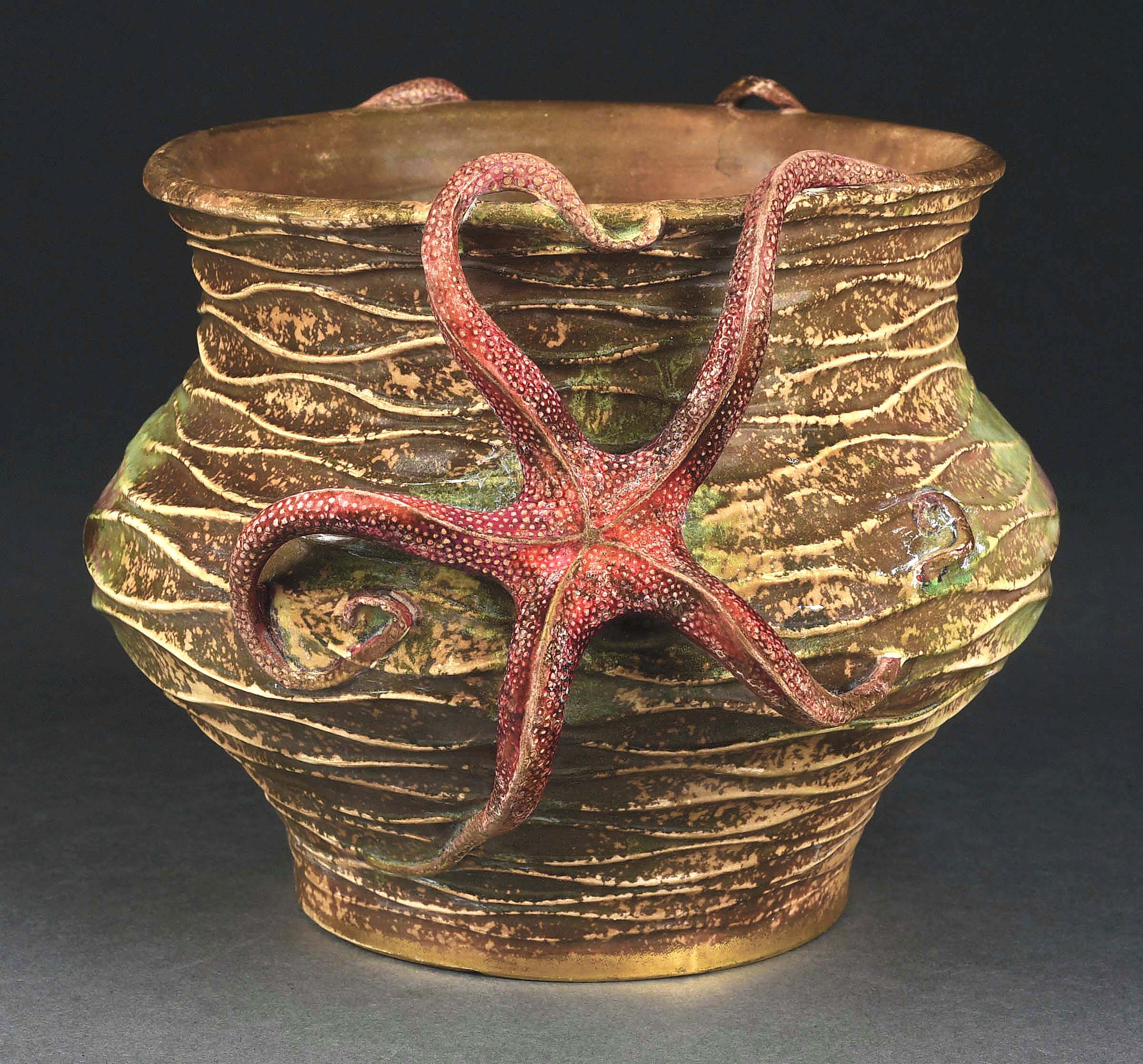
Starfish vase by Amphora, earthenware, 8 by 6½ by 5¾ inches, stretched to $17,220 ($2,5/3,500).
Collectors of aged liquors were especially pleased with two of the sale’s offerings. The first, a 1989 Rip Van Winkle bourbon, aged 25 years, and the second, a 140-year-old Hardy Perfection cognac. The Van Winkle bourbon was distilled by Stitzel-Weller in the spring and fall of 1989 — one of the last times any Van Winkle bourbons were distilled by Stitzel-Weller — and moved to stainless steel tanks in 2014. The decanter is numbered 214 of 710 and was sold with its original presentation case and certificate of authenticity for $29,520. A round crystal decanter of Hardy Perfection cognac in the Daum France “Water” design reached $18,450. The other four varieties of the Perfection Essential Elements series, “Air,” “Earth,” “Light” and “Fire,” were also offered separately in the auction. Each of these sold for $9,000 and all five Hardy cognacs were estimated at $5/8,000.
More than 200 lots of jewelry, watches and coins were offered in the sale. Leading that category and selling for $27,060 was an 1851 “887” $50 RE Augustus Humbert gold ingot. The coin was held in a PCGS case but marked “genuine not gradable.” Despite smoothing, particularly at the bottom by the date, PCGS still deemed the California gold slug to have “VF Details.” Another item in the category that saw success was a private label William B. Miller, Sacramento, Calif., 14K gold hunting case pocket watch made by Illinois Watch Company circa 1885. The intricately designed watch features gold, rose and white quartz inlays on the cover and chain. Attached to the chain are fobs with a quartz and lapis lazuli cigarillo cutter and a five-pointed Grand Army of the Republic star with a grizzly bear. The ornate watch earned $14,760.
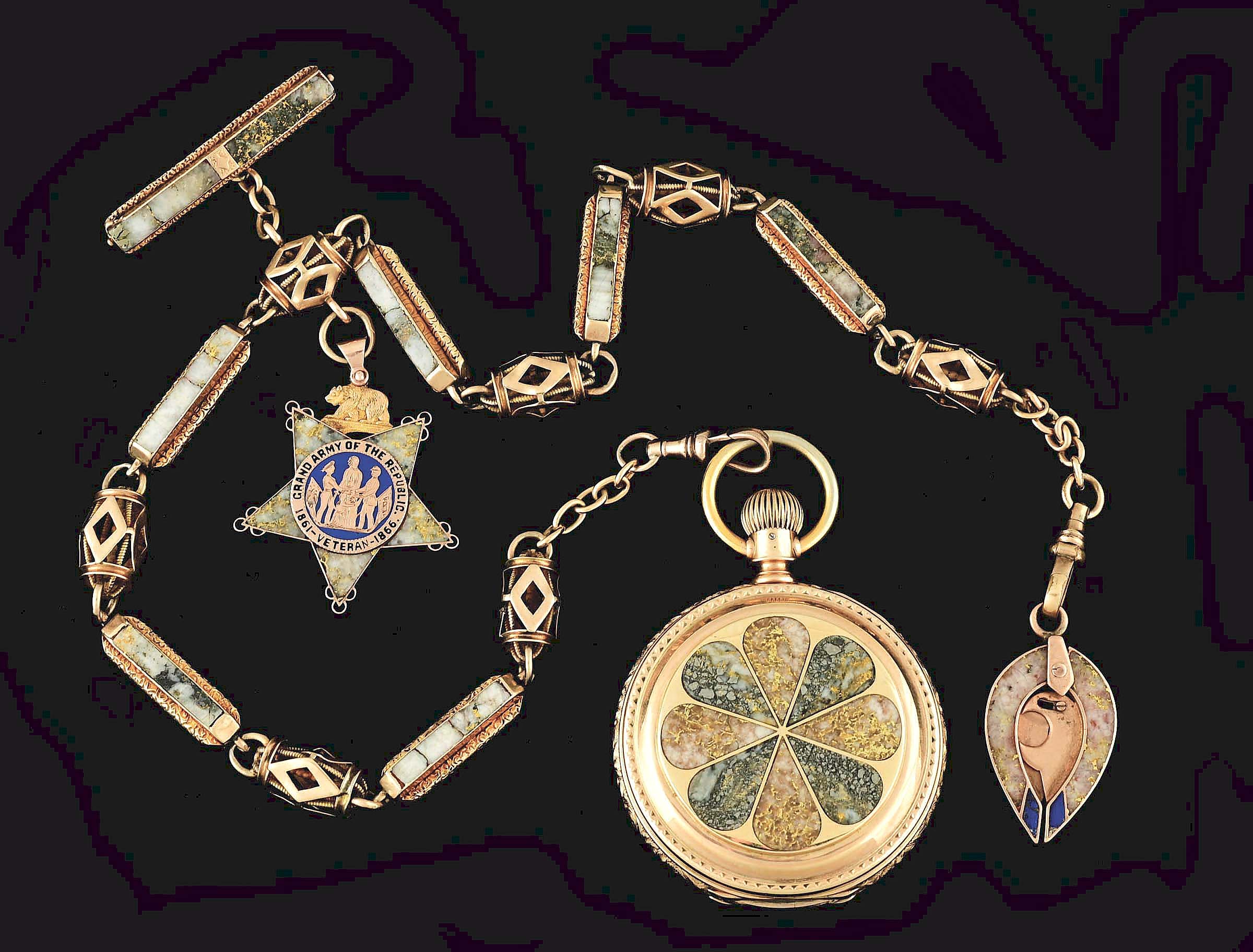
William B. Miller 14K gold and quartz pocket watch, circa 1885, achieved $14,760 ($15/25,000).
A rare and important stained glass window designed by Marion Mahony Griffin found a buyer for $26,460. The window was originally made for Griffin’s brother and his wife’s house in 1907 and was saved when the house was destroyed in 1967. Other windows from the house are now in collections such as the San Francisco Museum of Modern Art and the Bank of America Permanent Collection. The window was in excellent condition with no signs of cracking or other damage to the iridescent tiles.
More salvaged stained glass windows were offered in the sale. Most notable was a pair of 102-inch-tall Tiffany windows from the All Angels Episcopal Church in New York City. Each of the windows consisted of 62 amber roundels of cherub faces embellished by smaller plain amber roundels. The windows were designed for the church based on an 1897 sketch. The windows, in their original wooden frames, brought $23,040.
A surprising result was that of an occupational shaving mug, originally estimated at $300/600. The mug features an image of a horse-drawn ambulance and has the name “C. McNulty” scrolled across the top in gold gilt. It ended up finishing at $23,370.
Morphy Auctions will conduct its next auction, Brian Lebel’s Old West Auction, on January 26 in Las Vegas.
All prices quoted include the buyer’s premium, as reported by the auction house. For information, www.morphyauctions.com or 877-968-8880.

